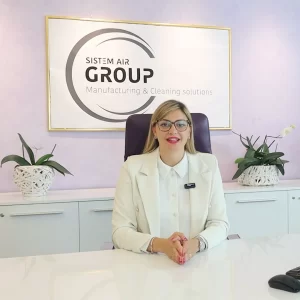
La nuova identità Sistem Air Group
L’evoluzione del logo del Gruppo esprime e anticipa la direzione aziendale determinata dall’espansione in nuovi settori e ampliamento della gamma prodotto

Air quality and sustainability are central issues for the wood biomass heating sector; companies, citizens and institutions must work together to adopt effective system policies to manage this critical situation.
An opportunity to learn about and evaluate the measures implemented by national and regional institutions after the condemnation by the European Court of Justice due to the excessive exceeding of the concentration limits of pollutants detected in the air was offered by the conference "2050 and renewable heat from wood" organised by AIEL on the occasion of Progetto Fuoco 2022.
How can we combine an efficient exploitation of wood resources with an improvement in air quality in areas chronically afflicted by this problem?
This was the question posed by the moderator of the conference, Fabio Romeo (Ispra/Mite), and the focus of the speeches by the representatives of the Regions, who gave an overview of the actions taken and the objectives to be achieved in both the short and medium to long term.
The experiences of the regions in the Po Valley Basin, illustrated by Gian Luca Gurrieri (Lombardy Region), Luca Marchesi (Veneto Region), Stefania Crotta (Piedmont Region) and Cecilia Guaitoli (Emilia-Romagna Region), show that many steps forward have been taken in defining coordinated interventions to reduce fine dust emissions from domestic wood biomass heating.
The improvement of air quality is based on 6 fundamental points:
Representatives from other areas interested in improving air quality, albeit in more localised areas, also drew on the experiences of the Po Valley Basin regions. Vincenza Giancristiano (Tuscany Region), Laura Bennati (Arpa Lazio), Vitaliano Palomba (Umbria Region) and Maria Rosaria Della Rocca (Campania Region), illustrated the Regions' targeted policies to reduce polluting emissions in geographically limited areas.
On this front, local incentive calls that can be cumulated with the Conto Termico for the replacement of obsolete systems also play a role.
The first experiments carried out by Piedmont, Lombardy and Emilia-Romagna made it possible to assess their effectiveness and areas for improvement.


The main tool for driving technological turn-over is the Conto Termico, whose features were illustrated by Alessandra Galatioto of the GSE.
Valter Francescato, Technical Director of Aiel, anticipated the main points of the new memorandum of understanding between AIEL and the Ministry of Ecological Transition, which updates the previous document of 2018 and emphasises the importance of activating a series of measures, including the commitment that each region will adopt a special resolution to regulate the installation, operation and control of woody biomass plants.
The proposal for an agreement with the Ministry of Economic Development also envisages that the Regions should launch calls for scrapping in synergy with the thermal account and commit themselves to implementing and populating the computerised registers.
A further contribution to the reduction of PM10 could come from the exclusive use of certified biofuels and from actions to "educate" the end user.
Vannia Gava, Undersecretary for Ecological Transition, explained in a statement: "Through the new Protocol, which is more operational than the previous one, we are identifying new guidelines to help citizens and operators carry out their activities in the best possible way, we are introducing more intensive training courses for operators, and we are promoting information campaigns at national level. Raising the awareness of all the actors in the chain and all the tools that the Ministry is putting in place, also thanks to the PNRR resources, will help to mark a change of pace in this sector too".

L’evoluzione del logo del Gruppo esprime e anticipa la direzione aziendale determinata dall’espansione in nuovi settori e ampliamento della gamma prodotto

Le energie rinnovabili, come il sole, il vento e l’acqua, giocano un ruolo sempre più importante nella transizione verso un’economia a basse emissioni di carbonio.

La proposta del Libro Bianco di Aiel per abbattere del 70% l’inquinamento da riscaldamento